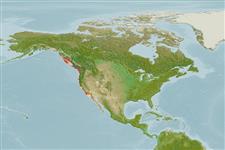Common names from other countries
>
Ovalentaria/misc (Various families in series Ovalentaria) >
Embiotocidae (Surfperches)
Etymology: Embiotoca: Greek, embios = permanent, for all the life + Greek, tokos,-oy = birth (Ref. 45335); lateralis: lateralis meaning lateral - referring to its blue stripes (Ref. 6885).
More on author: Agassiz.
Environment: milieu / climate zone / depth range / distribution range
Ecologie
marien demersaal; diepte ? - 21 m (Ref. 2850). Subtropical; 58°N - 29°N, 138°W - 115°W
Eastern Pacific: Wrangell, southeastern Alaska to Point Cabras, northern Baja California, Mexico.
Grootte / Gewicht / Leeftijd
Maturity: Lm ? range ? - ? cm
Max length : 38.0 cm TL mannelijk / geslacht onbekend; (Ref. 2850); max. gerapporteerde leeftijd: 10 Jaren (Ref. 56049)
Dorsale stekels (totaal): 10 - 11; Dorsale zachte stralen (totaal): 23-25; Anale stekels 3; Anale zachte stralen: 29 - 33. Copper ground color with dark brown overlay on back; a series of about 15 blue horizontal stripes below lateral line; head with several series of blue spots and stripes; fins coppery; dark areas on anterior part of rayed dorsal, base of caudal fin, anterior part of anal, and distal halves of pelvic fins (Ref. 6885).
Adults occur in rocky coasts and kelp beds, occasionally in sandy surf near rocks (Ref. 2850). Feed on small crustaceans, worms, and mussels; occasionally on herring eggs (Ref. 4925). Viviparous, female carries the developing young (Ref. 205).
Viviparous, female carries the developing young (Ref. 205).
Eschmeyer, W.N., E.S. Herald and H. Hammann, 1983. A field guide to Pacific coast fishes of North America. Boston (MA, USA): Houghton Mifflin Company. xii+336 p. (Ref. 2850)
Status op de Rode Lijst van het IUCN (Ref. 130435)
CITES (Ref. 128078)
Not Evaluated
Gevaar voor de mens
Harmless
Gebruik door de mens
Visserij: commercieel; sportvis: ja; Aquarium: Publieke aquaria
Meer informatie
ReferentiesAquacultuurAquacultuurprofielKweeklijnenGeneticaElectrophoresesErfelijkheidZiektesVerwerkingMassaconversie
Tools
Speciale rapporten
Download XML
Internetbronnen
Estimates based on models
Preferred temperature (Ref.
115969): 9.3 - 15.4, mean 10.7 (based on 149 cells).
Fylogenetische diversiteitsindex (Ref.
82804): PD
50 = 0.7500 [Uniqueness, from 0.5 = low to 2.0 = high].
Bayesian length-weight: a=0.01905 (0.00831 - 0.04372), b=2.97 (2.77 - 3.17), in cm Total Length, based on LWR estimates for this (Sub)family-body shape (Ref.
93245).
Trofisch niveau (Ref.
69278): 3.3 ±0.49 se; based on food items.
Weerstandsvermogen (Ref.
120179): Gemiddeld, minimale populatieverdubbelingstijd 1,4-4,4 jaar (tm=3; tmax=10).
Fishing Vulnerability (Ref.
59153): Low to moderate vulnerability (28 of 100).
